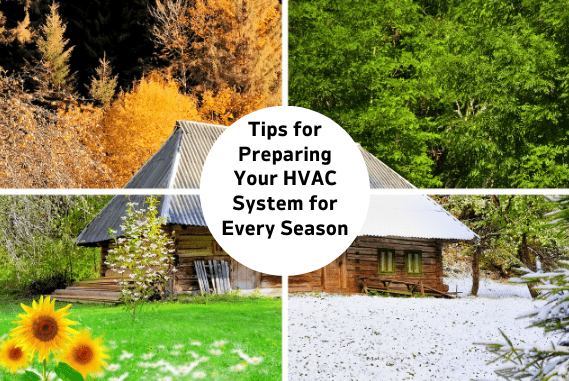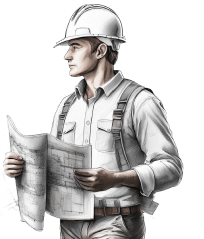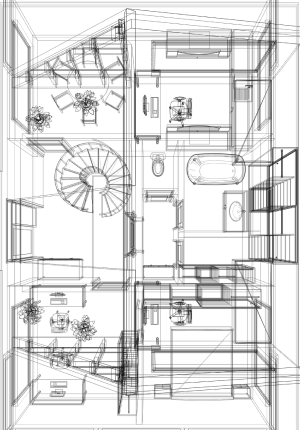Tips for Preparing Your HVAC System for Every Season

Throughout the year, our most valuable player in maintaining a comfortable and healthy indoor environment is our HVAC system. To ensure it operates efficiently and effectively in every season, proper preparation and maintenance are key. In this article, we’ll provide you with a comprehensive guide on how to prepare your HVAC system for each season.
- Regular Maintenance is Paramount
One of the most important steps you can take to keep your HVAC system in top shape is to schedule regular maintenance. Consider having a professional HVAC technician inspect and service your system twice a year, ideally in the spring and fall. These bi-annual check-ups help identify and address issues before they become major problems, ensuring your HVAC system’s longevity and efficiency.
During a maintenance visit, the technician will inspect various components of your HVAC system, clean filters and ducts, lubricate moving parts, check for refrigerant leaks, and calibrate your thermostat. This thorough inspection and tune-up are essential to keep your system running smoothly.
- Change Air Filters Regularly
Air filters are the unsung heroes of your HVAC system. They play a crucial role in improving indoor air quality and maintaining system efficiency. To ensure your HVAC system operates optimally, make it a habit to replace air filters regularly. The frequency of replacement depends on factors like the type of filter and your home’s air quality, but a general guideline is every 1-3 months.
Clogged or dirty filters restrict airflow, causing your system to work harder, which can lead to increased energy consumption and reduced efficiency. By changing your filters as recommended, you not only save on energy bills but also create a healthier indoor environment by trapping allergens and pollutants.
- Clean Vents and Ducts
Over time, vents and ducts can accumulate dust, debris, and allergens. This buildup can obstruct airflow and reduce the effectiveness of your HVAC system. Periodically, inspect and clean your vents and ducts or hire a professional to do so. Removing this debris not only helps maintain proper airflow but also improves indoor air quality.
- Check Thermostat Settings
Your thermostat plays a central role in controlling your HVAC system’s operation. To optimize energy usage and comfort, adjust your thermostat settings according to the season. In the winter, lower the temperature when you’re away or sleeping to conserve energy. Conversely, in the summer, raise the temperature when you’re not at home. Consider investing in a programmable or smart thermostat, which allows you to create customized schedules and remotely control your HVAC system.
- Inspect Insulation
Proper insulation is essential to prevent heat loss in the winter and heat gain in the summer. Ensure your home is well-insulated by checking for gaps and cracks in doors, windows, and walls. Seal any openings to maintain a consistent indoor temperature and reduce the workload on your HVAC system.
- Clean the Outdoor Unit
If you have a central air conditioning system, it’s crucial to keep the outdoor condenser unit clean. Regularly remove dirt, leaves, and debris from the unit’s exterior. Ensure that it’s free from obstructions, such as overgrown bushes or vegetation, to maintain efficient cooling performance.
- Clear the Area Around the Outdoor Unit
In addition to cleaning the outdoor unit, trim bushes, shrubs, and trees around it to ensure proper airflow. Overgrown vegetation can obstruct airflow and reduce the efficiency of your cooling system. Keeping the area clear helps your HVAC system operate smoothly and effectively.
- Check for Leaks
Regularly inspect your HVAC system for leaks, including refrigerant, water, and gas leaks. If you notice any signs of leakage, such as puddles or hissing sounds, contact a professional technician immediately. Addressing leaks promptly is essential for the safety and efficiency of your system.
- Test Your System Before the Season
Before each season begins, run your HVAC system for a short period to ensure it’s working correctly. This simple step can help you identify any issues before you rely on your system for comfort. If you notice any unusual noises, odors, or performance issues, contact a technician for further inspection and repairs.
- Upgrade Insulation and Windows
Consider making long-term improvements to your home’s insulation and windows to enhance energy efficiency. Well-insulated homes require less heating in the winter and cooling in the summer, reducing the workload on your HVAC system and lowering energy bills. Upgrading to energy-efficient windows can also help maintain a comfortable indoor temperature.
- Consider Zoning Systems
For enhanced control and comfort, think about installing zoning systems in your home. Zoning allows you to independently control the temperature in different areas or zones, ensuring that you only heat or cool the spaces you’re using. This can lead to significant energy savings and personalized comfort.
- Prepare for Winter
As the fall season approaches, it’s time to prepare your heating system for the winter ahead. Clean and inspect your heating components, replace any worn-out parts, and ensure safety features are functioning correctly. By addressing heating system maintenance early, you can avoid the discomfort of a breakdown during cold weather.
- Prepare for Summer
In the spring, it’s essential to prepare your air conditioning system for the upcoming summer heat. Clean or replace filters, inspect cooling components, and check for any issues that may have arisen during the winter months. Ensuring your air conditioner is in peak condition will help you stay cool and comfortable when the temperature rises.
In conclusion, proper preparation and maintenance of your HVAC system for every season are essential for its efficiency, longevity, and your comfort. By following these tips and staying proactive with maintenance, you can enjoy consistent indoor comfort while reducing energy consumption and costs. Additionally, regular inspections and tune-ups can help you catch and address issues before they become expensive repairs, ultimately prolonging the life of your HVAC system.


